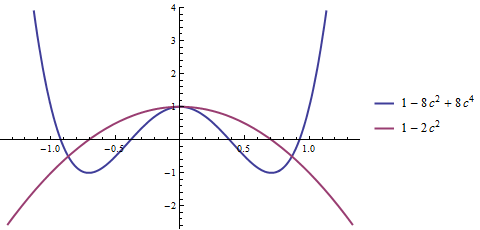We should exploit the second argument in Simplify or FullSimplify being an assumption on possible variables or symbols in a given axpression. For more complete discussion of simplification methods see the answers to this question What is the difference between a few simplification techniques?.
One should have consider a few cases since we could use various assumptions. Let's start with plotting graphs of polynomial functions apprearing in the expression. We'd like to distinguish cases where 1 - 8 c^2 + 8 c^4 and 1 - 2 c^2 are non-negative.
Plot[{ 1 - 8 c^2 + 8 c^4, 1 - 2 c^2}, {c, -4/3, 4/3},
PlotLegends -> "Expressions", PlotStyle -> Thick]

There are two independent terms which can be simplified in different ways with respect to assumptions given, e.g.
Simplify[ Sqrt[(-1 + 2 c^2)^2], #]& /@ {-(1/Sqrt[2]) < c < 1/Sqrt[2], 1/Sqrt[2] < c} //
Column
1 - 2 c^2
-1 + 2 c^2
We shouldn't impose accidental assumptions since expressions couldn't be simplified to the simplest form (appropriate assumptions for the first term, in general will not be adequate for the other one), e.g.
Simplify[ expression, #] & /@ {-(1/Sqrt[2]) < c < 1/Sqrt[2], 1/Sqrt[2] < c} // Column
4 ( 16 (1 - 2 c^2)^2 + Abs[1 - 8 c^2 + 8 c^4])^2
4 (-16 (1 - 2 c^2)^2 + Abs[1 - 8 c^2 + 8 c^4])^2
Here Sqrt[(1 - 8 c^2 + 8 c^4)^2] could be simplified only to Abs[1 - 8 c^2 + 8 c^4] since it is the most general (and the simplest) form satisfying imposed assumptions.
Now, in order to complete simplification we need to deal with Reduce for writing down different assumptions:
Grid[(cs = Table[ Reduce[ g[1 - 8 c^2 + 8 c^4, 0] && h[1 - 2 c^2, 0], c],
{g, {GreaterEqual, Less}}, {h, {GreaterEqual, Less}}]),
Frame -> All] // TraditionalForm

and the simplifications are respectively:
Grid[ Map[ Simplify[ 4(16Sqrt[(-1 + 2c^2)^2] - 32c^2 Sqrt[(-1 + 2 c^2)^2] +
Sqrt[(1 - 8c^2 + 8c^4)^2])^2, #] &, cs, {2}],
Frame -> All] // TraditionalForm

In general for more involved expressions one should deal with FullSimplify, nevertheless we get in our case the same expressions with Simplify.



